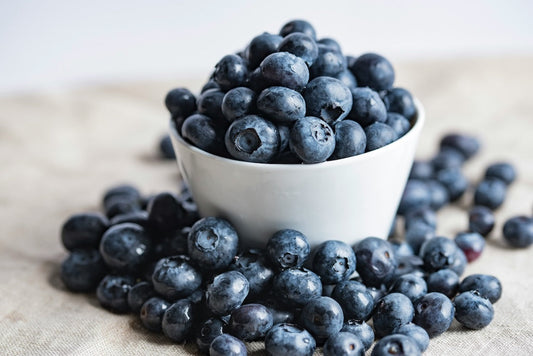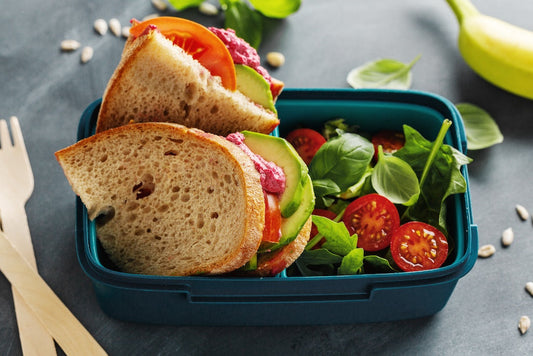A bloated stomach after eating can significantly affect your daily life. This uncomfortable feeling of fullness, which is often accompanied by pain or pressure, is a regular occurrence for many people. There are many reasons for this: from eating hastily to eating foods that cause bloating to stress, many things can trigger it.
But the good news is that you can avoid or alleviate bloating. In this article, you will learn what exactly bloating is, why it occurs and how you can reduce it with targeted measures. We will discuss nutrition, exercise and helpful tips that will give you a lighter feeling in your stomach.
Verival muesli without added sugar – try it now
What exactly is a bloated stomach?
A bloated stomach occurs when an excessive amount of air or gas accumulates in the gastrointestinal tract. The result is a bloated stomach that often becomes uncomfortably hard. Feelings of pressure and tension are also typical side effects.
Why does a bloated stomach occur?
There can be many different reasons for bloating. Common causes include air that you swallow when eating or drinking, as well as gases that are produced in the intestines during digestion. These gases are mainly produced when food that is difficult to digest is broken down by intestinal bacteria. Intolerances, such as lactose or gluten, can also lead to bloating.
When does bloating occur most frequently?
Most often, bloating is noticeable after eating. This is because your digestive system is working hard and gases are released in the process. Especially lavish meals or bloating foods such as legumes or cabbage can exacerbate the problem.
Meteorism – the medical condition explained!
Meteorism is the medical term for what we colloquially refer to as bloating. It is the excessive accumulation of gases in the gastrointestinal tract that cannot escape.
What factors contribute to meteorism?
An unhealthy or unbalanced diet often plays a central role in meteorism. Stress, lack of exercise and hormonal fluctuations, such as during menstruation, can also increase the discomfort. For some people, the cause lies in a disturbed intestinal flora, which means that digestion no longer functions smoothly.
Difference between meteorism and bloating
Flatulence is different from bloating, although the two often occur together. While gases escape through the intestines when you have flatulence, the air usually remains trapped in the abdomen when you have meteorism. This leads to a bloated abdomen that is often painful.
What are the symptoms of meteorism?
The symptoms of meteorism can be varied, ranging from a slightly bloated abdomen to severe pain.
How does a bloated belly manifest itself?
A typical symptom is a visibly bloated belly, which can feel hard. Often you feel an unpleasant pressure or even cramps. Many sufferers also report a feeling of overcrowding, even if they have only eaten a little.
Concomitants of meteorism
In addition to the bloated belly itself, other symptoms may occur. These include bloating, heartburn or nausea. In some cases, the pressure in the abdomen can even cause back pain. Stress or a lack of exercise can also intensify the symptoms.
When should you see a doctor?
In most cases, meteorism is harmless. However, if you experience chronic symptoms such as severe pain, weight loss or blood in your stool, you should definitely consult a doctor. These symptoms can indicate serious illnesses such as irritable bowel syndrome or inflammatory bowel disease.
Bloating and diet – foods to avoid
What you eat plays a crucial role in the development of bloating and meteorism. Certain foods are particularly likely to cause gas to build up in the intestines.
Which foods are the most likely culprits?
The most common causes of bloating include legumes such as lentils, beans and chickpeas. They contain fiber that is difficult to digest and produces gas in the intestines. Cabbages such as broccoli, Brussels sprouts and white cabbage are also among the foods that cause bloating. Dairy products can also cause problems, especially for people with lactose intolerance.
Sugar and artificial sweeteners
Not only natural foods, but also added industrial sugars can increase bloating. Fructose, which is found in fruit and processed foods, and sorbitol, a common sugar substitute, can put a strain on the digestive tract.
Fatty and heavily processed foods
Fried foods and ready meals often contain a lot of fats and additives that slow down digestion and cause bloating.
What is the connection between gut health and bloating?
Your gut plays a central role in your well-being. A healthy gut flora ensures smooth digestion and prevents excess gas build-up.
What is a healthy gut flora?
Your intestinal flora consists of billions of bacteria that perform important tasks in your digestive system. They help to absorb nutrients, break down toxins and regulate gases. If the intestinal flora is in balance, digestion will also work smoothly.
What damages the intestinal flora?
A disrupted intestinal flora can be caused by antibiotics, stress or an unbalanced diet. If harmful bacteria become dominant, digestive problems and bloating are more likely to occur.
How can you strengthen your intestinal flora?
Probiotics, which are found in foods such as yogurt, sauerkraut, and kefir, promote the good bacteria in the gut. Prebiotics, which are found in foods such as oats and asparagus, also support the growth of beneficial intestinal bacteria.
Fight bloating with the right diet
A sensible and balanced diet can effectively prevent or reduce flatulence.
Which foods help?
Easily digestible foods such as steamed vegetables, rice and potatoes put hardly any strain on the digestive tract and reduce gas formation. Lean meat and fish are also easy to digest.
What role do spices play?
Certain spices such as fennel, caraway and ginger aid digestion and counteract bloating. Fennel tea, for example, soothes the intestines and reduces cramps.
Hydration is an important factor
The drinks you choose also play a role. You should avoid carbonated drinks as they cause bloating. Instead, opt for still water or herbal teas such as peppermint or aniseed.
Do you get a bloated belly after eating? Here's what you can do about it!
There are a few things you can do immediately after eating to prevent or alleviate bloating.
Why exercise helps
Exercise is one of the most effective ways to combat bloating. A short walk after eating stimulates intestinal motility and helps to reduce gas more quickly.
Belly massage to help
A gentle clockwise belly massage can aid digestion and release trapped air. You should apply light pressure and move in small circles around the belly button.
Proven home remedies
Chewing fennel seeds or caraway seeds after a meal helps to relieve cramps and reduce gas. A cup of ginger tea or a glass of warm water with lemon can also work wonders.
How can you avoid bloating at breakfast?
Breakfast lays the foundation for your digestion throughout the day. With the right choice of food, you can avoid bloating in the morning.
Which breakfast options are suitable?
A mild millet porridge with cinnamon or steamed fruit such as apple pieces are easy to digest and do not put a strain on the stomach. A small smoothie made from banana and spinach, mixed with almond milk, is also a good choice.
Why high-fiber is not always better
Whole grain products are healthy, but they can cause bloating in people with sensitive bowels. Instead, choose white bread rolls or spelt bread and slowly increase your fiber intake.
Exercise and bloating – can exercise help to combat bloating?
Exercise can naturally support digestion. Particularly gentle forms of exercise have a direct effect on the bowels.
Which types of exercise are particularly helpful?
Yoga exercises such as the “downward-facing dog” or the “knee-to-chest” pose release air from the intestines and promote intestinal movement. Even a casual walk or bike ride can help digestion.
Why exercise is important in the long term
Regular exercise not only keeps your body fit, but also improves blood circulation in the digestive tract. This makes digestion more efficient and bloating less likely to occur.
Discover and celebrate the full Verival breakfast range here!
Conclusion: bloating after eating
A bloated stomach after eating is unpleasant, but it can be avoided with the right diet and a few small changes in behavior. Eat consciously, pay attention to your food choices and integrate exercise into your daily routine. With these tips, you can create a healthy basis for a better gut feeling and a discomfort-free everyday life. Start today and say goodbye to bloating!
























